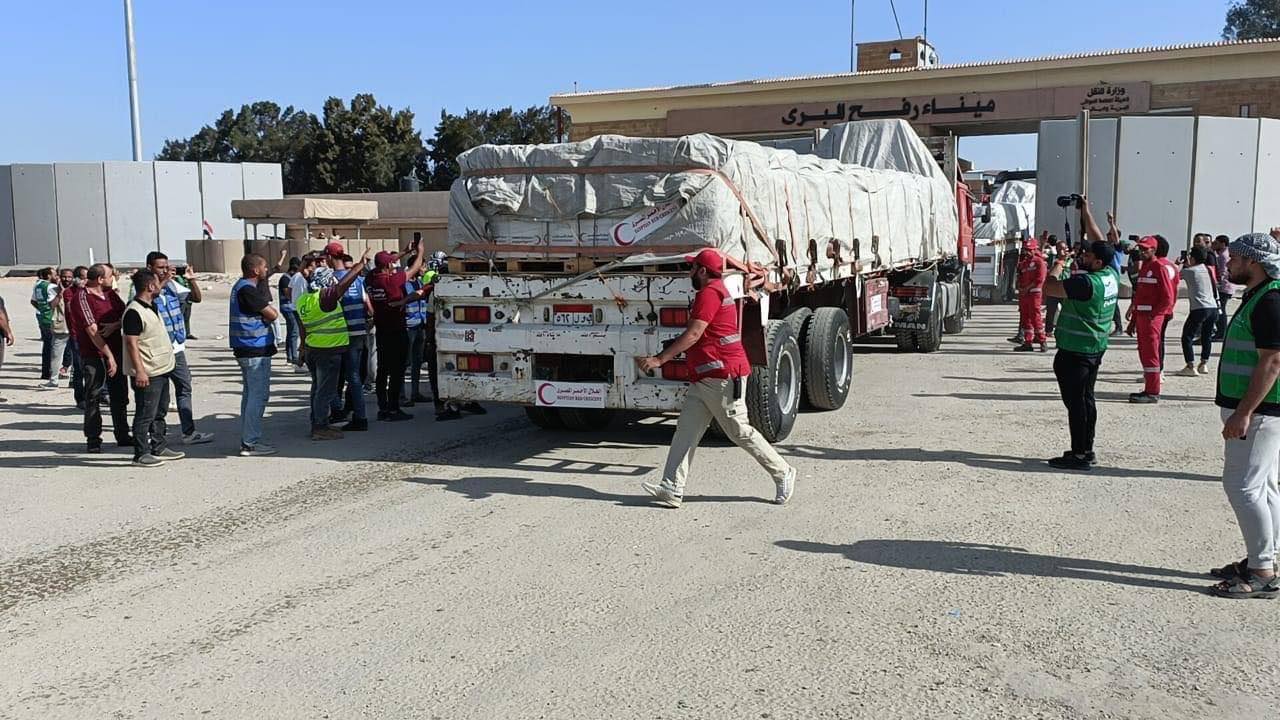In the face of escalating desperation in Gaza, the cost of passage has surged to $10,000 per person, according to reports.
An international charity, known for its emergency relief efforts in conflict zones, has exposed a staggering demand of $5,000 per truck from a company tied to Egypt’s General Intelligence Service (GIS) to facilitate the strict entry of aid into Gaza.
Choosing to remain anonymous to ensure its operations aren’t hindered, the charity openly condemned what it deems a bribe to a state-affiliated agent, expressing outrage at the drain on its resources.
A spokesperson for the charity told the Middle East Eye: “We have worked around the world in times of war, earthquakes and other disasters, but we have never been treated like this by a state who is profiteering from the dispatch of humanitarian goods. It’s draining a lot of our resources and the bribe being paid is per truck.”
The demanded sum, purportedly labelled a “management fee,” is funnelled to a company affiliated with the Sons of Sinai, owned by Sinai businessman Ibrahim al-Organi, head of the Tarabin tribe in the Sinai desert.
Al-Organi’s companies allegedly formed a joint venture with two entities owned by the GIS, MEE reported.
Media reports suggest the Organi Group, to which these entities belong, reaps the benefits of a lucrative trade involving “fast-track” permits for Palestinians seeking to flee Israel’s genocidal war in the Gaza Strip.
It fetches prices between $4,500 and $10,000 for Palestinians and $650 to $1,200 for Egyptians, unfolded in an investigation by the Organized Crime and Corruption Reporting Project (OCCRP) and Saheeh Masr.
In the face of escalating desperation in Gaza, the cost of passage has surged to $10,000 per person, reports said.
Organi-owned companies charge a staggering $9,000 per truck for commercial traffic entering Gaza, while truckers report receiving only $300 per load.
MEE’s exclusive report stands as the first evidence of Egypt or government-linked entities extracting fees from humanitarian aid meant for Gaza, already grappling with weeklong delays enforced by Israel.
However, UN agency UNRWA denies paying fees for aid transfers into Gaza from Egypt to MEE.
For years, a parallel “fast-track” system facilitating a passage through Rafah has existed, with agents based in Gaza demanding significant amounts of money, often in the thousands of dollars, for expedited transit.
However, this market has experienced a stark surge since the onslaught of Israel’s brutal war on Gaza, coupled with the increasing desperation of internally displaced Palestinians.
Among the entities implicated in this trade is Hala Consulting and Tourism, identified as an Egyptian travel agency. This particular company is one of eight operating under the principal arm of the Organi Group.
Another entity within the same group is Misr Sinai, engaged in a collaborative venture with the industrial conglomerate of the Egyptian defence ministry, known as the National Services Projects Organisation (NSPO).
Egypt has refuted claims of profiteering from the Rafah border crossing and disclaimed responsibility for the prolonged queues of trucks carrying humanitarian aid at the Egyptian side of the border.
In their defence against allegations of committing genocide in Gaza, brought to the International Court of Justice earlier this month, Israel’s defence team accused Cairo of obstructing the entry of humanitarian aid into the enclave.
While in Somalia, Egypt’s President Abdel Fattah El-Sisi accused Israel of causing delays for trucks on the Gaza side of the Rafah border, saying: “If I am the reason for not letting a loaf of bread into Gaza, how could I face God?”
Meanwhile, Israel has imposed full blockade and control since early October over the entry of food and water into Gaza, enforcing even more restrictions in the northern part of the enclave.
Israeli Defence Minister Yoav Gallant stated on October 9 that basic access to Gaza would be restricted for essential resources such as food, water, fuel, and medicine, asserting: “We are fighting human animals.”
Around 80% of those facing famine or catastrophic hunger globally are now residents of Gaza, a condition that signifies an unparalleled humanitarian crisis within the Gaza Strip amidst the ongoing bombardment and blockade by Israel, UN human rights experts said on January 16, according to an OHCHR statement.
Separately, Israel has denied access to around 95% of aid missions from delivering aid to northern Gaza within the first two weeks of January, the UN Office for the Coordination of Humanitarian Affairs said in its flash update on January 16.
The war, coupled with Israel’s complete siege on Gaza, caused a humanitarian catastrophe and the collapse of the local health sector.
Since October 7, Israel’s genocidal war on Gaza has killed at least 26,751 Palestinians and injured 65,636, Palestine’s Health Ministry reported.







